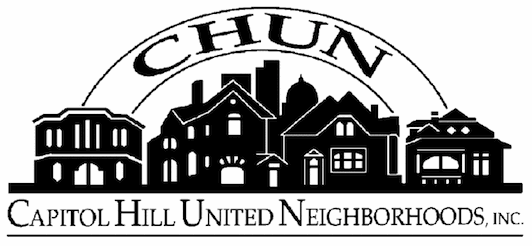Capitol Hill United Neighborhoods
Our Information
- Contact List
- Our contact information...
- Newsletter Archive
- Previous Newsletters...
About Us
Capitol Hill United Neighborhoods
Capitol Hill is one of the oldest residential areas in Denver. Development of the neighborhood began thanks in large part to the work of two men, Horace A.W. Tabor and Henry C. Brown. Until Tabor's arrival in the 1880s, Denver's growth had been from the city's center to the northwest, nearer to the South Platte River. Tabor bought land east of Larimer Street and wanted the city to develop to the east. To encourage such growth, he built the famous Tabor Grand Opera House on the corner of 16th and Curtis streets.
About this time building began on the site Henry C. Brown donated to the State of Colorado for the capitol, on the brow of a hill looking west towards the mountains. The ridge was known as Brown's Bluff, a Victorian double entendre referring to the folly of developing land so far from downtown.
These two acts served to turn the growth of Denver's business district eastward. As the business district advanced, the residential section moved ahead of it and occupied the "high, sightly prairie" known as Capitol Hill.
By the end of the 1880s, Capitol Hill was completely platted and a sizeable amount of development had occurred east of the Capitol and along the trolley lines on Colfax to Alta (now known as Ogden Street). It was on Capitol Hill that Colorado's wealthy built their mansions. The architecture was as eclectic as its inhabitants, from early Greek Revival to Tudor to Victorian. The Molly Brown House (listed as a Denver Landmark and also in the National Register of Historic Places), is one of the remaining houses from this early period. The prominence of Capitol Hill as "the" fashionable residential area continued until after the turn of the century, but as the city grew and prospered, the wealthy began to move further south and east to the Country Club and Cheesman Park areas.
After 1910, the complexion of Capitol Hill changed rapidly. As early as 1929, the first Master Plan of the City describes East Colfax as "formerly a principal residential street, and now in large part zoned for business and the principal artery through the Capitol Hill apartment district." The neighborhood was already a less exaggerated version of what it has become today.
During World War II, Capitol Hill provided rooms and apartments to people who could not find housing elsewhere. These non-conforming apartments were formally recognized in 1955 with overall high density residential (R-3) zoning of the neighborhood. This zoning spelled the beginning of the end of Capitol Hill as a well-balanced single-family home and apartment district. Inflated real estate values caused by the neighborhood's central location and proximity to down- town accelerated this trend. Today, fewer than 4 percent of the structures in Capitol Hill are single-family units, 22 percent of all units are converted homes or small apartment buildings, and almost 75 percent are in large apartment buildings or complexes. Population density is now the highest in the city.
About our association
History of CHUN
In 1969, a group of concerned citizens rallied to fight the proposed conversion of east 11th and 12th Avenues into one-way streets. The citizens' victory over city planners marked the beginning of what is now known as Capitol Hill United Neighborhoods, Inc. or CHUN, one of Denver's oldest and largest neighborhood organizations. CHUN's boundaries exted from 1st to 22nd Avenues, from Broadway to Colorado Boulevard.
CHUN is an organization dedicated to its mission of enhancing the quality of life on Capitol Hill through:
Preserving the Past,
Improving the Present,
Planning for the Future of Capitol Hill
CHUN promotes a sense of neighborliness, improves the physical appearance of the neighborhood, provides a poweful, unified voice, encourages representation and cooperation amoung diverse groups, works on specific neighborhood problems and concerns, promotes a more positive image of the neighborhood and takes actions designed to improve the quality of life on Capitol Hill.
CHUN is a membership organization and actively solicits your involvement in your neighborhood. For more information, please call us at 830-1651.
Email us
info@chundenver.org



